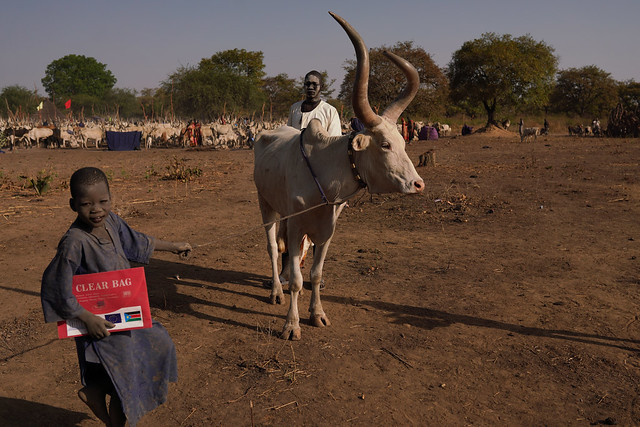Contributions to mitigating conflict between mobile pastoral communities in South Sudan

This Learning Brief documents the main lessons drawn from the country investment implemented jointly by FAO and UNESCO and their implementing partners in South Sudan from 2019 to 2021 in the framework of the Global Network Against Food Crises Partnership Programme, funded by the European Union. It showcases key learning on the role of the Pastoralist Livelihoods and Education Field Schools (PLEFS) approach in enhancing food security and livelihoods resilience of mobile pastoral communities and households in South Sudan’s cattle camps. More specifically, this learning brief explores how and to what extent an approach like PLEFS contributes to mitigating conflict and building resilience in pastoral areas.
The document unpacks the various building blocks of PLEFS, an approach tailored to the local cattle camp context integrating:
- The provision of essential learning and education services in remote areas, including literacy, numeracy, life skills and basic skills training; and
- The delivery of livelihood skills transfer and the development of capacities at community and institutional levels, including production, marketing and business management in addition to asset creation.
It identifies the extent to which they constituted contributory pathways to sustaining peace, presenting measured impacts and effects witnessed by cattle camps’ leaders and members about the transformation of conflict dynamics. For example, households declaring being affected by the theft of agricultural assets, crops or livestock, reduced from 10.2 to 3.7 percent over the duration of the project, and 3/4 women in PLEFS-targeted cattle camps expressed that the level of conflict and violence had decreased. The learning brief also identifies opportunities created by PLEFS to establish new paradigms among pastoralist communities, in the economic, social and cultural dimensions of cattle camp life. The project’s impact evaluation revealed improvements in the resilience capacity index of the beneficiary population from 39 to 51, and the percentage of households at an acceptable level of food consumption score also progressed by 12 points during the implementation period. Hence the PLEFS stands out as a good practice to promote peacebuilding and social cohesion, and as an impactful, holistic and innovative approach for the resilience and food security of remote pastoral communities.
SOME KEY TAKEAWAYS
- On conflict-sensitive programming: Integrating conflict management into emergency and resilience programming is critical to ensure lasting changes and safeguard development gains. As exemplified by PLEFS, both direct (e.g. dispute resolution mechanisms) and indirect (e.g. animal health or income-generating activities) contributions to peace prove to be a very effective and all-encompassing approach to transforming conflicts where those constitute a main driver of chronic food insecurity and malnutrition and strengthening individual, household and collective resilience capacities.
- On integrated programming: The integrated approach of PLEFS combining education and functional literacy, income-generation and savings schemes, disaster risk reduction, animal health and conflict mitigation, provided pastoralist men, women, girls and boys with the necessary skills and services to build their resilience. Literacy, numeracy and life skills constituted key learning pillars to improve livelihoods and social prospects for cattle camps communities, providing alternatives to deleterious cycles of cattle raiding and revenge violence. The focus on actively engaging youths specifically contributed to tackling the likelihood of their instrumentalization and conflict at its roots, with arguably a durable effect for generations.
- On gender: While pastoral communities are largely excluded from accessing basic and social services, pastoralist women and girls face double marginalization and discrimination in their livelihoods and social relations because of a strict gender code imposed by the patriarchal culture and norms of South Sudan traditional societies. The combination of basic education with livelihoods and income sources diversification provided women with a degree of financial autonomy, which in turn enabled them to integrate community decision-making bodies. Awareness-raising and sensitization within the cattle camps preceded women’s involvement, and the early benefits of livelihoods diversification activities provided further cause among camp leaders for their inclusion.
- On agricultural livelihoods: There has been a general improvement in the project area in terms of agricultural assets and inputs used compared to non-targeted cattle camps, and increased access to animal health services, which illustrate enhanced community and institutional capacity to promote and deliver integrated pastoral services. Improved animal health and productivity, and a reduction in the likelihood of livestock disease outbreaks, combined with diversified and enhanced livelihoods and income sources, contributed to reduce some of the economic drivers of cattle raiding, or conversely, the opportunity cost of engaging in violence was increased.
- On the HDP nexus: PLEFS approach constitutes an inspiring example of a humanitarian–development–peace nexus approach intervention. Indeed, it i) saves lives and livelihoods and protects people against the adverse effects of shocks that dramatically affect their food security and safety; ii) addresses multidimensional and structural challenges and contributes to essential development gains; and iii) delivers critical peace contributions to mitigate the outbreak, continuation and escalation of conflicts. It proved to effectively reduce needs, vulnerabilities and risks for mobile pastoral communities through an area-based approach.
- On learning: Asserting the peace-contributing dimensions of resilience interventions requires the development of peace-responsive MEAL frameworks, drawing on the findings from conflict and context analysis, to ensure that the “contributory pathways to sustaining peace” are properly monitored and documented with robust quantitative and qualitative data.


